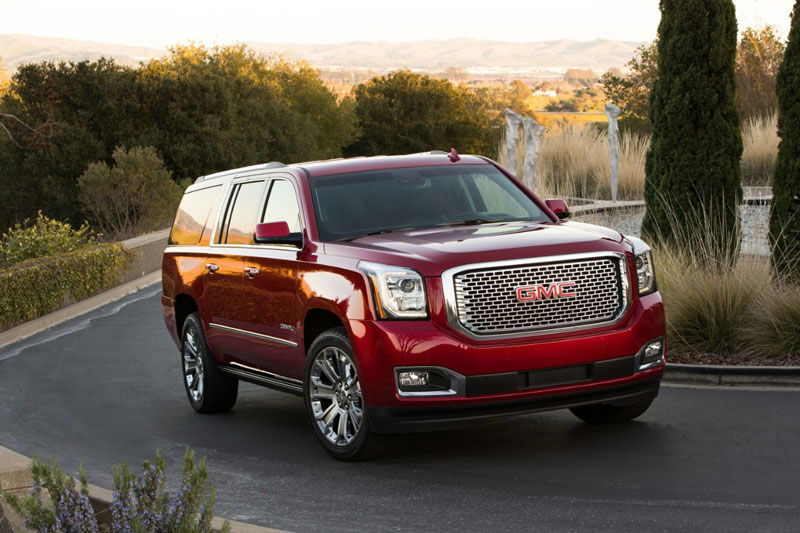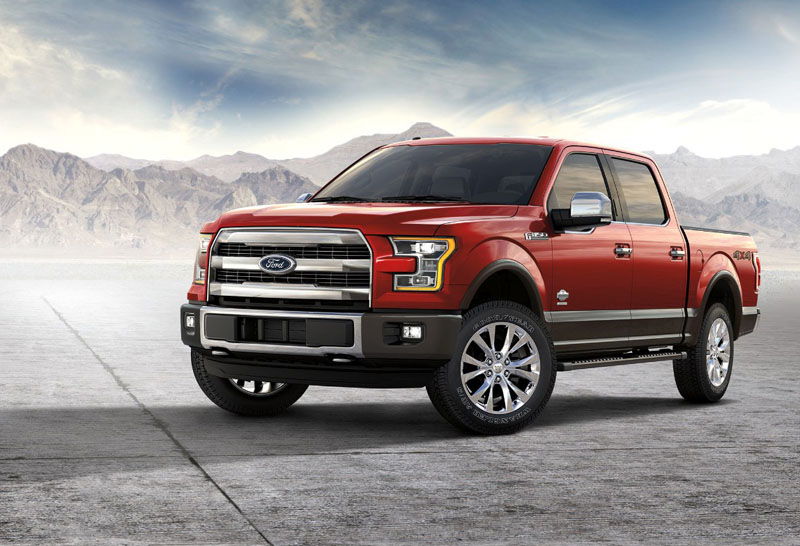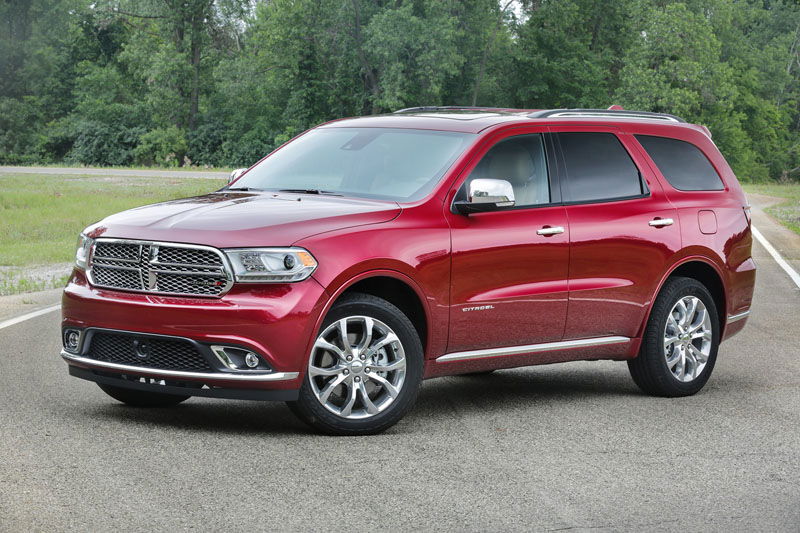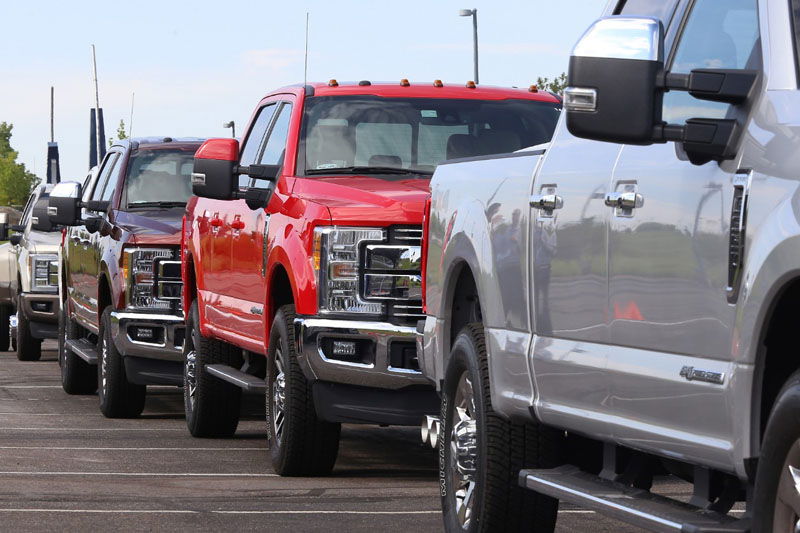Fuel Prices Are About To Surge, Yet Americans Continue To Buy Trucks In Record Numbers

The year was 2008. I was working in a call center in Southeast Michigan helping auto insurance adjusters figure out how much wrecked cars were worth. I’d recently left a position working with the performance division at Ford because, well, everyone was leaving. The way things were going with all the auto companies at that time, I figured switching to the insurance side would be recession-proof. After all, no matter how bad things get, people still crash. Right?
Long story short, it wasn’t recession-proof. But I did survive the auto industry collapse and global financial meltdown living just 40 miles from ground zero - AKA Detroit, Michigan. I was lucky; in that part of the country there were business executives with 20 years of experience and multiple college degrees fighting for jobs at Wal-Mart. Engineers who could rewire the International Space Station couldn’t get jobs flipping burgers at McDonalds.
Many of them were also saddled with pickup trucks or massive luxury SUVs.

I’m not against such vehicles, and with a rather inefficient V8 car sitting in my garage right now, I’d be a gigantic hypocrite if I said people shouldn’t buy them. But my Mustang isn’t a daily driver, and at 1/20th the cost of that GMC Yukon, I can easily afford something else that’s a bit more frugal. Most truck and SUV buyers don’t take that extra step; they look for the snazziest model they can afford and plunge into it without considering what would happen if petrol prices double or triple.
The bigger-is-better mentality with nary a concern for economy in this day and age is where I facepalm, because we should’ve learned a serious lesson by now. This is how so many people lost their shirts a few years back, not to mention their vehicles and homes. And it’s how General Motors - once the largest auto manufacturer in the world - went bankrupt.
And my spider sense tells me it’ll be happening again, in the not-so-distant future. More on that in a moment.
I know - us Americans are crybabies when it comes to petrol because Europe pays far more than we do. Europe also has a wide range of vehicles that do 50mpg, whereas we are still stuck in the 30mpg range, save for a few hybrids. It all balances out, but more importantly, Europeans buy those efficient diesel hatchbacks because most are pretty decent cars, and you know, they don’t want to spend all of their money on petrol driving to the pub.
Here in the States, when petrol topped $4.00 a gallon many people didn’t get that memo. They kept right on driving their 15mpg pickup trucks to the pub, to work, to the mall, anywhere they wanted to go until their bank accounts and credit cards literally disintegrated. Once they realised something needed to change it was too late. People were broke, and because their trucks drank more fuel than a Eurofighter in full afterburner, they were virtually worthless.

I clearly remember talking to an auto insurance adjuster during my time at the call center. It was September 2008 and Hurricane Ike had just hit the Texas gulf coast. The adjuster had several total loss claims from the area; people couldn’t afford to drive their pickups and SUVs, nor could they sell them because nobody wanted to buy them. So they just drove them to the beach before the storm hit, and let Ike’s storm surge do the rest. They failed to realise insurance payouts were based on current values anyway, so I suspect many people were still left owing money on vehicles they no longer had.
Today, pickup trucks and SUVs in the US have grown bigger than ever, and American buyers are right back to soaking them up. And it’s not as if they suddenly became fuel misers either - despite hype from manufacturers about “60 percent better fuel economy” they all still suck. Literally. A 2016 GMC Yukon still gets 16mpg. The best pickups or big SUVs might reach 20.
Americans bought a record 17.4 million cars last year, eclipsing the previous record set in 2000. So far this year overall sales are down by roughly eight percent, but large SUVs, crossovers and pickup truck sales are actually up quite a bit. Petrol in the States has been between $2.00 and $2.50 for most of the year, which is certainly encouraging people to go right back to loving their big, thirsty, do-all workhorses.

I can’t fault manufacturers for building the vehicles people want to buy, nor can I call out people for making purchases from the heart. If you want a big pickup and can afford it, do it. I won’t lie - pickups and SUVs are pretty damn nice these days. But you better have a plan when (yes when) energy prices go back into the stratosphere. Because that new 18mpg off-roader that never goes off-road will get crazy expensive quicker than you can say government bailout.
Oh how quickly people forget, but if petrol prices double in the next couple years - and I believe they will - people will quickly and tragically remember. How do I know this will happen? Well, let’s take a look at current events.
OPEC just announced a cut in oil production, the first such deal since 2008. Prior to that, US auto sales had been strong - record-level strong - led by pickup trucks and SUVs taking advantage of low petrol prices in the States.

Maybe I’m being pessimistic. Maybe this time the crash won’t be quite so bad. The auto market in the US is more diverse with small, efficient alternatives to trucks and big SUVs that are legitimately good. And since 2008 there’s been quite an expansion in shale oil production in the States, and when oil tops $50 a barrel that production will likely ramp back up. Maybe people will be smarter this time. Maybe there won’t be another crash at all.
Or maybe in a couple years we’ll see more Yukons, F-150s and Durangos parked along the Southern U.S. coastline, waiting for the storm surge to roll in.
Comments
I’ts my personal opinion (feel free to disagree) that everyone should drive the car most suited to their needs and intentions. If you work in construction or towing for a living, you actually do need that 5.7L Turbo Diesel. But it usually does not work out that way. A former classmate of mine bought (his parents bought actually) a very large truck (cant remember the make or model but I do remember the massive 5.7L badge on the side at eye level. (I’m 6 foot 2 so that’s saying something) I asked him what he did for work and his response was cashier at a grocery store but took the truck offroading.. The continued conversation ended with me reminding him he could’ve bought and insured a 2005 ish ford focus as a daily and a Jeep or older truck as an offroader for less than just that truck cost. His response was. “well… s**t” (I’m in the south… could ya’ tell?) This is a far too often mentality/mistake.
I live in the UK, and currently premium unleaded petrol costs about £1.20 a litre or in US Gallons $6.20ish.
I’m driving a 2006 MINI Cooper S, and it averages 26ish MPG.
Suddenly the pick ups in the US don’t seem so ridiculous when their fuel is so cheap. Even if the prices double they’ll still pay less than us!
Besides I love my MINI, roundabouts wouldn’t be the same in anything else. So I’ll keep paying out the arse for fuel lol.
This is the reason why the rest of the world views us as fat idiots…
I drive a manual Integra, and those B series powertrains are quite bullet-resistant, and it is possible to drive them quite economically. Hopefully I’ll be able to keep it for 5 years as long as nothing catastrophic goes wrong.
I just bought a brand new STI 😨 rip me and my gas mileage
Great article, have not seen this discussed very often, and you did it great.
Gas isn’t going to go up that much, oil isn’t going anywhere near $100 per barrel.
Any supply drop from APEC will be temporary because they need revenue and other producers will simply fill the gap. US producers are now profitable from as little as $20 per barrel, as the price increases US suppliers will activate the wells that they have that are proven but not pumping.
Damn, I wish the fuel prices would just stay down…I can actually afford to run my car during college at these prices
Dang. My almost 20 yr old 3/4 ton pickup gets better mpgs than these. I never pay attention to new cars, so I actually didn’t know about this. History always repeats itself…
This all depends on what truck or SUV you buy and, of course, how much you will make. My dad’s Tacoma got better gas mileage than my Tiburon did. The Tib was smaller, lighter, and had a smaller engine that made 50hp less but got a slightly lower mpg than a truck that was also a year older. Granted, it’s not an F-150 or a Silverado but it is a truck. A new V8 F-150 can average just short of 20mpg which is above where my Tib was at and just under the Tacoma. Trucks (and some SUVs) are improving, just at a very slow rate.
And after having driven an Elantra, I could never drive an econobox. It was excruciating. I feel like “sport” mode was added as a joke. I may be half-broke college student but an extra 10-15mpg isn’t enough to get me to drive something that takes 8+ seconds to reach 60 on level ground during a good day at sea level.
Pagination